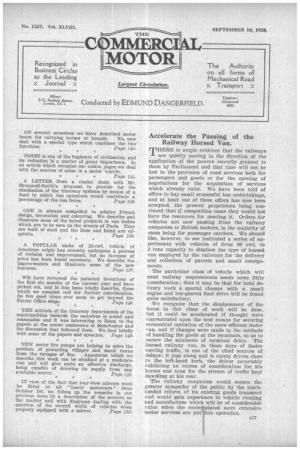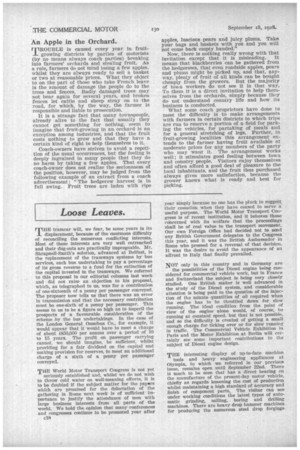Accelerate the Passing of the Railway Horsed Van.
Page 1

Page 2

If you've noticed an error in this article please click here to report it so we can fix it.
THERE is ample evidence that the railways are quietly moving in the direction of the application of the powers recently granted to them by Parliament and that time will not be lost in the provision of road services both for passengers and goods or for the opening of negotiations for the acquisition of services which already exist. We have been told of offers to buy small successful bus undertakings, and at least one of these offers has now been accepted, the present proprietors being convinced that if competition came they would not have the resources for meeting it. Orders for vehicles are now passing from the railway companies to British makers, in the majority of cases being for passenger carriers. We should like, however, to see instituted a series of experiments with vehicles of from .34 cwt. to 2 tons capacity to displace the type of horsed van employed by the railways for the delivery and collection of parcels and small consignments.
The particular class of vehicle which will meet railway requirements needs some little consideration ; thus it may be that for local delivery work a special chassis with a small engine and low-geared final drive will be found quite satisfactory.
We recognize that the displacement of the horse in this class of work will be slow, but it could be accelerated if thought were concentrated upon the best means for securing economical operation of the more efficient motor van, and if changes were made in the methods of handling the goods at the terminals, so as to secure the minimum of terminal delay. The horsed railway van, in these days of faster moving traffic, is one of the chief sources of delays: it jogs along and is rarely driven close to the left-hand kerb, the driver invariably exhibiting an excess of consideration for his horses and none for the stream of traffic kept dawdling at his rear.
.The railway companies would secure the greater sympathy of the public by the muchneeded reform of its existing goods transport and would gain experience in vehicle running and manufacture which will be of considerable value when the conte plated more extensive motor services are put nto operation. TROUBLE is caused every year In fruitgrowing districts by parties of motorists (by no means always coach parties) breaking into farmers' orchards and stealing fruit. As a rule, farmers do not mind losing a few apples, whilst they are always ready to sell a basket or two at reasonable prices. What they object to on the part of those who take• French leave Is the amount of damage the people do to the trees and fences. Badly damaged trees may not bear again for several years, and broken fences let cattle and sheep stray on to the road, for which, by the way, the farmer is responsible and liable to prosecution.
It is a strange fact that many townspeople, already alive to the fact that usually they cannot get something for nothing, seem to imagine that fruit-growing in an orchard is an exception among industries, and that the fruit costs nothing to grow and that they have a certain kind of right to help themselves to it.
Coach-owners have striven to avoid a repetition of the usual occurrences, but the feeling is deeply ingrained in many people that they do no harm by taking a few apples. That every coach-owner does not realize the seriousness of the position, however, may be judged from the following example of an extract from a coach advertisement : The hedgerow harvest is in full swing. Fruit trees are laden with ripe apples, luscious pears and juicy plums. Take your bags and baskets with you and you will not come back empty handed."
Now, there is nothing really wrong with that Invitation except that it is misleading. It means that blackberries can be gathered from the hedgerows, that even roadside apples, pears and plums might be picked up, and that, anyway, plenty of fruit of all kinds can be bought cheaply from the growers. But the majority of town workers do not see it in that way. To them it is a direct invitation to help themselves from the orchards, simply because they do not understand country life and how its business is conducted.
What some coach proprietors have done to meet the difficulty is to make arrangements with farmers in certain districts to which trips are run to reserve a portion of a field for parking the vehicles, for partaking of meals and for a general stretching of legs. Further, in fruit-growing localities this arrangement extends to the farmer having fruit available at moderate prices for any members of the party who may want it. The arrangement works well; it stimulates good feeling between town and country people. Visitors enjoy themselves and often afford a good deal of pleasure to the local inhabitants, and the fruit thus purchased always gives more satisfaction, because the grower knows what is ready and best for picking.
































